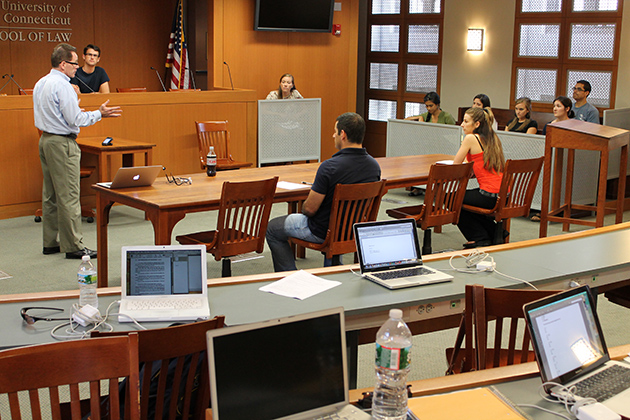
The University of Connecticut School of Law has adopted a “practice-based learning” requirement which will ensure that all students have at least one intensive, carefully supervised, live lawyering experience before graduating from law school.
The new requirement, which takes effect with next year’s entering class, was voted on by the faculty in early November. Fewer than 20 other U.S. law schools currently have a similar requirement.
“The Law School has long been a leader in experiential legal education,” says Willajeanne F. McLean, interim dean. “We were an early pioneer in clinical education, and students today can choose from a very broad and diverse range of clinics and externships.
“These programs offer an essential supplement to classroom-based learning. By adopting this requirement, we are signaling our continuing commitment to preparing our students to practice law, and to do so competently and ethically,” McLean says.
The Law School has long been a leader in experiential legal education.
Students will be able to satisfy the new requirement in several different ways. First, they can enroll in any of the Law School’s 15 faculty-supervised clinical programs, including the Criminal Clinic (established in 1969); the Tax Clinic (established in 1999); the Intellectual Property and Entrepreneurship Clinic (established in 2000), which is part of a state economic development initiative; the Asylum and Human Rights Clinic (established in 2002), which helps refugees from persecution and torture gain political asylum; and the Mediation Clinic (established in 1994), which helps resolve disputes between landlords and tenants as well as other matters.
Clinical programs also include externship clinics in which students are placed with non-profit public interest organizations, state agencies, judges, and legislators.
A second way in which students will be able to satisfy the new requirement is through an individual externship. In order to qualify, such an externship must be certified as providing high-quality legal supervision, and the student must work at least 14 hours per week in the placement and participate in an accompanying seminar.
A third way to satisfy the requirement will be to enroll in a course that includes a substantial component in which students participate in teams or as a group in one or more live lawyering projects.
Educational benefits
The new practice-based learning requirement was proposed by the Curriculum Review Committee, which was constituted a year ago to conduct a multi-year, comprehensive review of the Law School’s curriculum and recommend changes to it.
“When students are placed in settings where their decisions and actions have real consequences for people and institutions, there are enormous educational benefits,” says Paul Chill, professor of law and chairman of the committee.
“By emphasizing careful planning, conscious decision-making, and critical reflection, these experiences can teach professional judgment, shape and nurture professional values, and inculcate habits of effective lifelong learning,” he said. “The ultimate result of this kind of training is that clients, the legal system, and the public at large will be better served by our graduates.”
The committee’s work is ongoing, and McLean expects more proposals to be forthcoming. “We recognize that the legal landscape is changing and that we need to make legal education more responsive to the needs of 21st century students, their future clients, and employers,” she says.


